
Digestive Health Made Easy: Try These 6 Ayurvedic Home Remedies Now
Maintaining optimal digestive health is essential for overall well-being and vitality. Our digestive system plays a crucial role in breaking down food, absorbing nutrients, and eliminating waste. When our digestion is smooth and efficient, we feel lighter, more energized, and experience fewer digestive discomforts such as bloating, gas, and indigestion.
In the realm of holistic medicine, Ayurveda offers a treasure trove of wisdom and natural remedies to support digestive health. Ayurveda, which translates to “the science of life,” is an ancient system of medicine that originated in India thousands of years ago. It emphasizes the importance of balance in mind, body, and spirit for optimal health and well-being.
Understanding Ayurvedic Principles-:
Before we delve into the specifics of Ayurvedic home remedies for digestive health, let’s explore the foundational principles of Ayurveda. At the heart of Ayurveda lies the concept of the three doshas: Vata, Pitta, and Kapha. These doshas are dynamic forces that govern different physiological functions in the body, and their balance is key to maintaining health.
- Vata: Associated with movement and communication in the body, Vata governs functions such as breathing, circulation, and elimination. An imbalance in Vata can lead to dryness, constipation, and erratic digestion.
- Pitta: Representing the elements of fire and water, Pitta governs metabolism, digestion, and transformation in the body. When Pitta is out of balance, it can manifest as acidity, inflammation, and hyperacidity.
- Kapha: Comprising the elements of earth and water, Kapha governs structure, stability, and lubrication in the body. Imbalanced Kapha may lead to sluggish digestion, heaviness, and congestion.
According to Ayurveda, maintaining a balance of the doshas is essential for digestive health. Imbalances can occur due to various factors such as diet, lifestyle, stress, and environmental influences. Ayurvedic remedies aim to pacify aggravated doshas and restore equilibrium to the body.
1. Triphala: The Ultimate Digestive Tonic
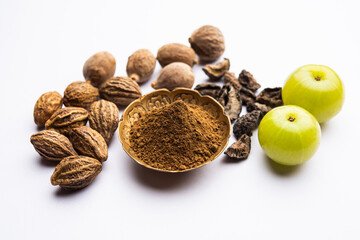
Triphala is a revered herbal formula in Ayurveda, prized for its ability to promote digestive health and overall well-being. The name “Triphala” translates to “three fruits” in Sanskrit, referring to its three key ingredients: Amalaki (Emblica officinalis), Bibhitaki (Terminalia bellirica), and Haritaki (Terminalia chebula).
The Power of Amalaki, Bibhitaki, and Haritaki
Each of the three fruits in Triphala possesses unique properties that synergistically contribute to its effectiveness as a digestive tonic.
- Amalaki: Also known as Indian gooseberry, Amalaki is rich in vitamin C and antioxidants. It supports the immune system, aids in digestion, and helps maintain healthy skin and hair.
- Bibhitaki: Bibhitaki is renowned for its astringent and detoxifying properties. It helps remove toxins from the body, supports respiratory health, and promotes healthy digestion.
- Haritaki: Haritaki is considered the “king of herbs” in Ayurveda for its rejuvenating and cleansing effects. It helps regulate bowel movements, detoxifies the digestive tract, and supports overall digestive function.
How to Use Triphala?
Triphala is typically consumed in powdered form, although it is also available in capsule and liquid extract forms. To prepare Triphala powder, the three fruits are dried and ground into a fine powder, preserving their potent medicinal properties.
One of the most common ways to consume Triphala is by mixing one teaspoon of the powder with warm water or herbal tea. It is best taken on an empty stomach, either in the morning or before bedtime, to support detoxification and regularity. Triphala can also be combined with honey or ghee (clarified butter) for added benefits.
Benefits of Triphala for Digestive Health
Triphala offers a multitude of benefits for digestive health, making it a cornerstone of Ayurvedic medicine:
- Promotes Regularity: Triphala acts as a gentle laxative, supporting regular bowel movements and preventing constipation.
- Detoxifies the Digestive Tract: The cleansing properties of Triphala help remove toxins and impurities from the digestive tract, promoting detoxification and purification.
- Supports Digestive Function: Triphala enhances digestion by stimulating digestive enzymes, improving nutrient absorption, and reducing bloating and gas.
- Balances the Doshas: Triphala helps balance the three doshas, making it suitable for all body types (Vata, Pitta, and Kapha).
In addition to its digestive benefits, Triphala is also revered for its rejuvenating and anti-aging properties. It supports overall vitality, strengthens the immune system, and promotes longevity.
2. Ginger: Nature’s Digestive Aid

Ginger (Zingiber officinale) is a versatile herb that has been used for centuries in Ayurveda and traditional medicine systems around the world. It is prized for its warming and stimulating properties, making it an excellent remedy for digestive issues.
The Digestive Benefits of Ginger
Ginger contains bioactive compounds such as gingerol and shogaol, which have anti-inflammatory, antioxidant, and digestive-stimulating properties. Here are some ways in which ginger supports digestive health:
- Stimulates Digestive Enzymes: Ginger stimulates the production of digestive enzymes, which aid in the breakdown of food and promote efficient digestion.
- Relieves Digestive Discomfort: Ginger helps alleviate symptoms such as bloating, gas, indigestion, and nausea by relaxing the gastrointestinal muscles and reducing inflammation.
- Supports Motility: Ginger promotes gastric motility, helping food move more smoothly through the digestive tract and preventing sluggish digestion.
How to Incorporate Ginger Into Your Diet
There are numerous ways to incorporate ginger into your daily routine to support digestive health:
- Ginger Tea: Brewing fresh ginger slices in hot water to make ginger tea is a simple and effective way to enjoy its digestive benefits. Add honey and lemon for added flavour and immune-boosting properties.
- Fresh Ginger: Chewing on a small piece of fresh ginger before meals can help stimulate digestion and prevent bloating and gas.
- Cooking with Ginger: Adding grated or minced ginger to stir-fries, soups, curries, and other dishes not only enhances flavour but also aids in digestion.
Ginger: More Than Just a Digestive Aid
In addition to its digestive benefits, ginger offers a wide range of therapeutic properties:
- Anti-Inflammatory: Ginger contains potent anti-inflammatory compounds that help reduce inflammation and alleviate pain associated with conditions such as arthritis and muscle soreness.
- Immune-Boosting: Ginger has immune-boosting properties that help strengthen the body’s defences against infections and illnesses.
- Antioxidant: The antioxidants in ginger help protect cells from damage caused by free radicals, reducing the risk of chronic diseases and premature ageing.
Whether consumed fresh, as a tea, or in culinary dishes, ginger is a versatile herb that can enhance both the flavour of your meals and the health of your digestive system.
3. Ajwain: A Remedy for Indigestion
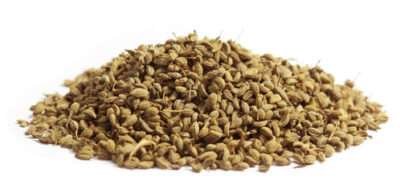
Ajwain, also known as carom seeds, is a popular spice in Indian cuisine and traditional medicine. It has a distinctive flavour and aroma and is prized for its digestive and medicinal properties.
The Digestive Benefits of Ajwain
Ajwain seeds contain essential oils such as thymol, which have carminative, antispasmodic, and digestive-stimulating properties. Here’s how ajwain supports digestive health:
- Relieves Indigestion: Ajwain helps alleviate indigestion, bloating, and flatulence by promoting the secretion of digestive juices and reducing gas formation.
- Eases Stomach Discomfort: Ajwain has antispasmodic properties that help relax the muscles of the gastrointestinal tract, relieving stomach cramps and discomfort.
- Aids in Detoxification: Ajwain aids in the detoxification of the digestive tract by expelling toxins and promoting healthy elimination.
How to Use Ajwain
Ajwain seeds can be used in various forms to reap their digestive benefits:
- Raw Ajwain: Chewing on a few raw Ajwain seeds after meals can help alleviate digestive discomfort and freshen the breath.
- Ajwain Water: Boiling ajwain seeds in water to make ajwain water is a popular remedy for indigestion. Simply strain the seeds and drink the infused water for quick relief.
- Ajwain Tea: Steeping ajwain seeds in hot water to make ajwain tea is another way to enjoy its digestive benefits. You can add honey or lemon for added flavour and sweetness.
Ajwain: More Than Just a Digestive Aid
In addition to its digestive properties, ajwain offers a myriad of health benefits:
- Respiratory Support: Ajwain has expectorant properties that help alleviate respiratory conditions such as asthma, bronchitis, and coughs.
- Antibacterial: The essential oils in ajwain have antibacterial properties that help fight off infections and protect against bacterial pathogens.
- Pain Relief: Ajwain is used externally as a poultice or in oil form to relieve pain and inflammation associated with arthritis, muscle spasms, and joint pain.
Ajwain is a versatile spice that not only enhances the flavour of dishes but also provides powerful medicinal benefits, particularly for digestive and respiratory health.
4. Fennel Seeds: Aniseed for Digestive Comfort
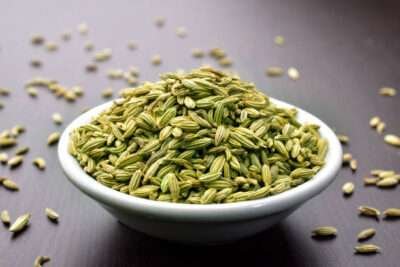
Fennel seeds, also known as saunf or aniseed, are aromatic seeds commonly used in culinary preparations and herbal medicine. They have a sweet, liquorice-like flavour and are prized for their digestive and carminative properties.
The Digestive Benefits of Fennel Seeds
Fennel seeds contain volatile oils such as anethole, which have antispasmodic, carminative, and digestive-stimulating properties. Here’s how fennel seeds support digestive health:
- Relieves Bloating and Gas: Fennel seeds help alleviate bloating, gas, and flatulence by relaxing the muscles of the gastrointestinal tract and reducing gas formation.
- Soothes Digestive Discomfort: Fennel seeds have a calming effect on the stomach and intestines, helping to ease digestive discomfort and cramping.
- Promotes Healthy Digestion: Fennel seeds stimulate digestion by promoting the secretion of digestive enzymes and facilitating the breakdown of food.
How to Use Fennel Seeds
Fennel seeds can be enjoyed in various ways to support digestive health:
- Chew Fennel Seeds: Chewing on a few fennel seeds after meals can help freshen the breath and promote digestion.
- Fennel Seed Tea: Steeping fennel seeds in hot water to make fennel seed tea is a popular remedy for digestive issues. Simply strain the seeds and drink the infused water for soothing relief.
- Cooking with Fennel Seeds: Adding fennel seeds to culinary dishes such as curries, soups, and salads not only enhances flavour but also aids in digestion.
Fennel Seeds: More Than Just a Digestive Aid
In addition to their digestive properties, fennel seeds offer a range of health benefits:
- Respiratory Support: Fennel seeds have expectorant properties that help relieve coughs, congestion, and respiratory conditions such as bronchitis and asthma.
- Antioxidant: The antioxidants in fennel seeds help protect cells from damage caused by free radicals, reducing the risk of chronic diseases and premature ageing.
- Menstrual Relief: Fennel seeds are traditionally used to relieve menstrual cramps, bloating, and discomfort due to their antispasmodic and analgesic properties.
Fennel seeds are a versatile spice that not only enhances the flavour of dishes but also provides potent medicinal benefits, particularly for digestive and respiratory health.
5. Cumin: Enhancing Digestive Fire
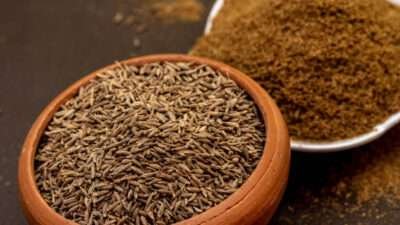
Cumin (Cuminum cyminum) is a flavorful spice widely used in culinary preparations worldwide. It has a warm, earthy flavour and is prized for its digestive and medicinal properties in Ayurveda.
The Digestive Benefits of Cumin
Cumin contains essential oils such as cumin aldehyde and thymol, which have digestive-stimulating, carminative, and antimicrobial properties. Here’s how cumin supports digestive health:
- Stimulates Digestive Enzymes: Cumin stimulates the secretion of digestive enzymes, which aid in the breakdown of carbohydrates, fats, and proteins.
- Reduces Bloating and Gas: Cumin helps alleviate bloating, gas, and flatulence by relaxing the muscles of the gastrointestinal tract and reducing gas formation.
- Enhances Nutrient Absorption: Cumin improves nutrient absorption by promoting the assimilation of vitamins, minerals, and other essential nutrients from food.
How to Use Cumin
Cumin can be incorporated into your diet in various ways to support digestive health:
- Cooking with Cumin: Adding cumin seeds or ground cumin to culinary dishes such as curries, soups, stews, and rice preparations enhances flavour and aids in digestion.
- Cumin Tea: Steeping cumin seeds in hot water to make cumin tea is a simple and effective way to enjoy its digestive benefits. Simply strain the seeds and drink the infused water for soothing relief.
- Cumin Powder: Sprinkling roasted cumin powder on fruits, salads, yoghurt, or other dishes not only adds a flavorful twist but also aids in digestion.
Cumin: More Than Just a Digestive Aid
In addition to its digestive properties, cumin offers a range of health benefits:
- Anti-Inflammatory: Cumin contains anti-inflammatory compounds that help reduce inflammation and alleviate symptoms associated with conditions such as arthritis and inflammatory bowel disease.
- Antioxidant: The antioxidants in cumin help protect cells from damage caused by free radicals, reducing the risk of chronic diseases and premature ageing.
- Immune-Boosting: Cumin has immune-boosting properties that help strengthen the body’s defences against infections and illnesses.
Cumin is a versatile spice that not only enhances the flavor of dishes but also provides potent medicinal benefits, particularly for digestive and immune health.
6. Coriander: Cooling and Soothing
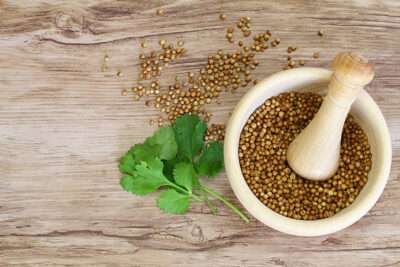
Coriander (Coriandrum sativum), also known as cilantro or dhania, is a popular herb that is widely used in culinary preparations around the world. It has a bright, citrusy flavor and is prized for its cooling and soothing properties in Ayurveda.
The Digestive Benefits of Coriander
Coriander seeds contain essential oils such as linalool and geranyl acetate, which have digestive-stimulating, carminative, and anti-inflammatory properties. Here’s how coriander supports digestive health:
- Relieves Digestive Discomfort: Coriander seeds help alleviate digestive discomfort such as bloating, gas, and indigestion by relaxing the muscles of the gastrointestinal tract and reducing inflammation.
- Soothes Irritation: Coriander seeds have a soothing effect on the stomach and intestines, helping to calm irritation and inflammation associated with digestive disorders.
- Balances Pitta Dosha: Coriander seeds help pacify excess Pitta dosha, making them particularly beneficial for individuals with a Pitta constitution or imbalanced Pitta.
Introducing Gastric Care – Your Comprehensive Digestive Support Solution

In addition to incorporating natural herbs and spices like coriander into your diet, you may also benefit from specialized supplements designed to support digestive health. Gastric Care is a premium digestive support formula crafted with traditional Ayurvedic ingredients to promote optimal digestion and gastrointestinal comfort.
Key Features of Gastric Care:
- Herbal Blend: Formulated with a synergistic blend of Ayurvedic herbs known for their digestive properties, including coriander, ginger, and cumin.
- Digestive Support: Supports healthy digestion by promoting the secretion of digestive enzymes and soothing gastrointestinal discomfort.
- Gentle and Effective: Gentle on the stomach with natural ingredients that work in harmony to support digestive function without harsh side effects.
- Natural Ingredients: Made with high-quality, natural ingredients sourced from trusted suppliers to ensure purity and potency.
Discover 6 effective Ayurvedic home remedies to enhance your digestive health effortlessly. Plus, keep your gut healthy this summer with ‘Stay Cool and Digest Well: 7 Essential Tips for a Healthy Gut This Summer .
How Gastric Care Works:
Gastric Care works by addressing the root causes of digestive discomfort and promoting balance within the digestive system. By incorporating this advanced digestive support formula into your daily routine, you can experience enhanced digestive function, reduced bloating and gas, and greater overall gastrointestinal comfort.
What are the best Ayurvedic home remedies for improving digestion?
Ayurvedic home remedies such as consuming warm ginger tea, incorporating turmeric into meals, and using Triphala can significantly improve digestion. These remedies help balance digestive fire (Agni) and support gut health.
How does Triphala benefit digestive health?
Triphala, a combination of three fruits, promotes regular bowel movements, reduces bloating, and detoxifies the digestive system. It supports a healthy gut microbiome and enhances nutrient absorption.
Can Ayurvedic remedies help with chronic indigestion?
Yes, Ayurvedic remedies can help manage chronic indigestion by restoring balance in the digestive system. Practices like consuming fennel seeds after meals, drinking buttermilk with cumin, and following a Pitta-pacifying diet can alleviate symptoms.
Are there any dietary changes recommended in Ayurveda for better digestion?
Ayurveda recommends eating freshly prepared, warm meals, avoiding cold and processed foods, and including spices like cumin, coriander, and fennel in your diet. Eating mindfully and following regular meal times also contribute to better digestion.
How can I maintain digestive health during summer using Ayurvedic practices?
To maintain digestive health during summer, stay hydrated with cooling drinks like coconut water and buttermilk, eat light and easily digestible foods, and follow the tips from ‘Stay Cool and Digest Well: 7 Essential Tips for a Healthy Gut This Summer’ to keep your digestion in top shape.

